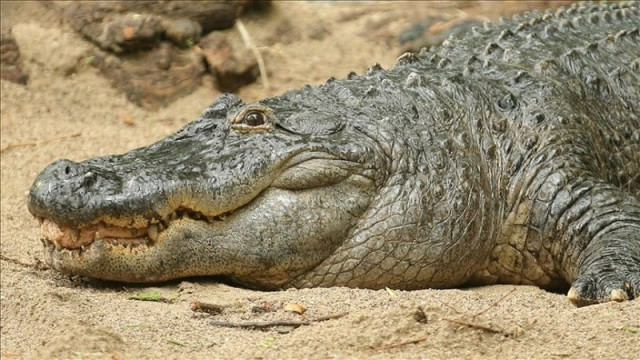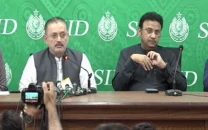Pakistan’s marsh crocodiles falling prey to climate ravages
Droughts, floods, warming temperatures among raft of climate-related threats to marsh crocodiles

The population of marsh crocodiles is constantly dwindling in Pakistan due to a slew of climate change-driven factors, according to wildlife experts.
The crocodile’s numbers have dropped by 30% to 35% over the past two decades, currently standing somewhere between 700 and 1,000, Muhammad Moazzam Khan, a technical adviser for WWF-Pakistan, told Anadolu.
“Periodical droughts, torrential rains, warming temperatures, frequent flooding, and habitat fragmentation are the key factors behind this decline,” he said.
Sindh and Balochistan’s rivers, lakes, marshes and ephemeral waterways are known habitats for the reptile, also known as the mugger or freshwater crocodile, along with some parts of Punjab.
Balochistan’s four coastal rivers – Hingol, Kech, Hub and Basul – have a healthy crocodile population, according to the WWF-Pakistan official.
“These rivers rely on rainwater, which leaves behind small and big ponds to serve as habitats for the crocodiles. However, these ponds are drying up much quicker due to warming temperatures and less rain,” he said.
Read also: Cutting of shrubs, trees affects wildlife
Flooding and torrential rains, on the other hand, wash out juvenile crocodiles to the sea or near it, where they cannot survive since this is a terrestrial reptile that needs land to live and breed, he said.
According to Khan, the construction of the Mirani Dam on Kech River in 2007 dealt a severe blow to the crocodile population, but there are no exact estimates for the losses.
Attaullah Pandrani, a Balochistan-based ecologist, stressed the need for a fresh survey to determine the actual population of the crocodile.
“It could be higher than 1,000 because of their captive breeding at many places, including various private zoos,” he told Anadolu.
“Until there is a new count, there will be varying estimates, including mine, which stands between 1,000 to 1,500.”
Ecological balance
The marsh crocodile is known to have spread from southern Iran to the Indian subcontinent.
Out of three crocodile species found in the region, it was the only one recorded during the latest study by the Zoological Survey of Pakistan.
Globally, it is considered to be vulnerable, according to the Red List of the International Union for Conservation of Nature, but is generally believed to be endangered.
Crocodiles are important for ecological balance and the natural food chain, said Pandrani, who has been associated with several habitat and species conservation projects.
Read: ‘Gharial’ crocodiles discovered in Sutlej
Marsh crocodiles help sustain the population of edible fish by eating carnivorous fish, especially those belonging to the catfish family, he explained.
“Less crocodiles in rivers mean less marketable fish because they maintain the prey-and-predator balance by eating specific fish and other harmful water creatures,” he said.
Also, he added, crocodiles play a crucial role in cleaning river water by feeding on carcasses, dead fish and other dead substances from the riverbed.
“It’s kind of nature’s scavenger,” he said.
Respected creature
Though crocodiles have a negative image of being lethal predators, most species are relatively harmless and actively avoid humans.
In many parts of the country, local communities consider them sacred and try to protect them.
In the rare instances when they pop up in inhabited areas, they are usually caught and released back in the wild.
In late April, a marsh crocodile was caught by locals near the Pakistan-Iran border and released into the Dashat River, which enters Pakistan from Iran and merges into the Kech River.
In Karachi, there is a shrine of Sufi saint Mangho Pir that is famous for its resident crocodiles, which many believe are the saint’s manifestation.
Also read: WATCH: Locals capture marsh crocodile near Balochistan’s Dasht River
The reptiles are in a vast pond at the centuries-old shrine and are regularly fed by visitors. Some historians believe the crocodiles themselves have been there for centuries, one of the reasons why people also consider them sacred.
Apart from environmental ravages, poaching and hunting are also threats to crocodiles in the country due to the demand for their skin, with international and local reptile smuggling gangs believed to be involved.
However, WWF-Pakistan official Khan disagrees on the gravity of this particular threat.
“Poaching or hunting are not major factors in their declining numbers. They are rarely killed, and that is only when they come near inhabited places or kill goats or livestock,” he said.
“There is no demand for their skin in Pakistan. All such killings are usually a result of negative human-wildlife interactions.”


















COMMENTS
Comments are moderated and generally will be posted if they are on-topic and not abusive.
For more information, please see our Comments FAQ